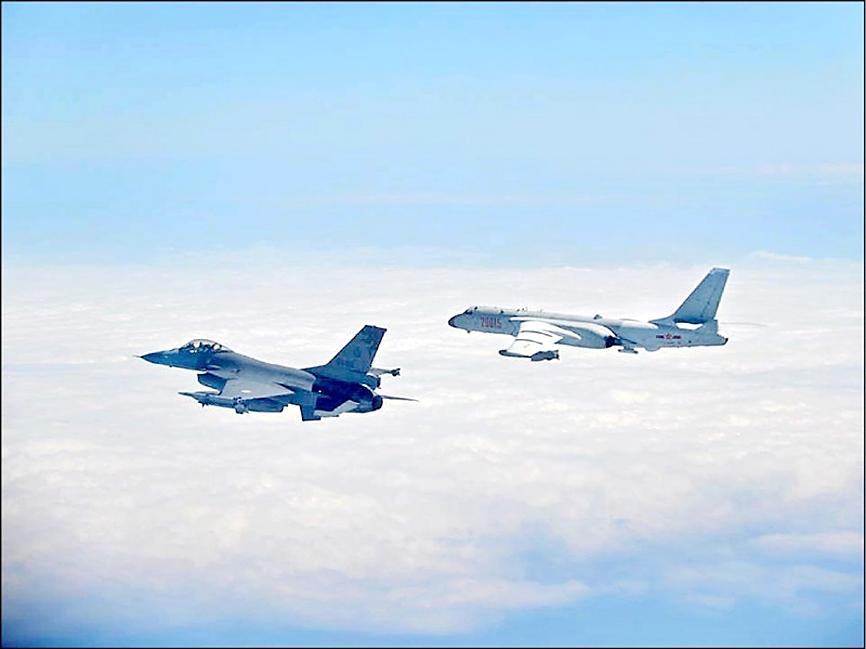The air force last year spent about 1,000 training flight hours on intercepting Chinese military aircraft in airspace near Taiwan, the Ministry of National Defense said in a report to the legislature’s Foreign Affairs and National Defense Committee.
Chinese People’s Liberation Army Air Force (PLAAF) aircraft last year accounted for 97 percent of all People’s Liberation Army actions that the ministry classifies as harrying Taiwan’s defenses, the report said.
While the PLAAF has been conducting such flights since 2017, it has shifted its focus from circling Taiwan to intruding into the northwestern sector of the nation’s air defense identification zone, it said.

Photo courtesy of the Ministry of National Defense
The Republic of China Air Force’s typical countermeasures have been to track the Chinese aircraft with air-defense missile systems or intercept them with jet fighters, it said, adding that trainer jets were at times employed for interceptions.
To reduce the mission load on fighter pilots and ground crew, the air force has adopted the practice of dispatching C-130 cargo planes and P-3C marine patrol planes to intercept slower-moving Chinese aircraft, it said.
The air force has also adjusted its ratio of flight training and interception, as well as areas of responsibility and areas of flight training for fighter units to increase sustainability, the report said.
The training of pilots was not disrupted by the actions of Chinese aircraft, as overall training flight hours increased by 3 percent, it said.
Su Tzu-yun (蘇紫雲), a senior researcher at the ministry-funded Institute for National Defense and Security Research, said Taiwan should increase the tactical flexibility of its response to counter the ubiquity of China’s air activity.
In similar situations, NATO member states and Japan would monitor the intruding aircraft with radar to determine their bearing before committing fighters to intercept them, he said.
Additionally, the air force should change the frequency of interception missions and deploy different numbers of aircraft to make its response more unpredictable, Su said.
In the long term, the military should consider utilizing armed drones in defensive air patrols, he said, citing the US Air Force’s experiments with arming MQ-9 drones with AIM-9 missiles.

DEFENDING DEMOCRACY: Taiwan shares the same values as those that fought in WWII, and nations must unite to halt the expansion of a new authoritarian bloc, Lai said The government yesterday held a commemoration ceremony for Victory in Europe (V-E) Day, joining the rest of the world for the first time to mark the anniversary of the end of World War II in Europe. Taiwan honoring V-E Day signifies “our growing connections with the international community,” President William Lai (賴清德) said at a reception in Taipei on the 80th anniversary of V-E Day. One of the major lessons of World War II is that “authoritarianism and aggression lead only to slaughter, tragedy and greater inequality,” Lai said. Even more importantly, the war also taught people that “those who cherish peace cannot

STEADFAST FRIEND: The bills encourage increased Taiwan-US engagement and address China’s distortion of UN Resolution 2758 to isolate Taiwan internationally The Presidential Office yesterday thanked the US House of Representatives for unanimously passing two Taiwan-related bills highlighting its solid support for Taiwan’s democracy and global participation, and for deepening bilateral relations. One of the bills, the Taiwan Assurance Implementation Act, requires the US Department of State to periodically review its guidelines for engagement with Taiwan, and report to the US Congress on the guidelines and plans to lift self-imposed limitations on US-Taiwan engagement. The other bill is the Taiwan International Solidarity Act, which clarifies that UN Resolution 2758 does not address the issue of the representation of Taiwan or its people in

US Indo-Pacific Commander Admiral Samuel Paparo on Friday expressed concern over the rate at which China is diversifying its military exercises, the Financial Times (FT) reported on Saturday. “The rates of change on the depth and breadth of their exercises is the one non-linear effect that I’ve seen in the last year that wakes me up at night or keeps me up at night,” Paparo was quoted by FT as saying while attending the annual Sedona Forum at the McCain Institute in Arizona. Paparo also expressed concern over the speed with which China was expanding its military. While the US

‘FALLACY’: Xi’s assertions that Taiwan was given to the PRC after WWII confused right and wrong, and were contrary to the facts, the Ministry of Foreign Affairs said The Ministry of Foreign Affairs yesterday called Chinese President Xi Jinping’s (習近平) claim that China historically has sovereignty over Taiwan “deceptive” and “contrary to the facts.” In an article published on Wednesday in the Russian state-run Rossiyskaya Gazeta, Xi said that this year not only marks 80 years since the end of World War II and the founding of the UN, but also “Taiwan’s restoration to China.” “A series of instruments with legal effect under international law, including the Cairo Declaration and the Potsdam Declaration have affirmed China’s sovereignty over Taiwan,” Xi wrote. “The historical and legal fact” of these documents, as well